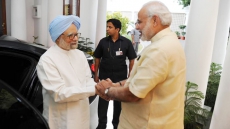Accusing the Sikh clergy of bowing before Akali Dal leaders, particularly of Punjab Chief Minister Parkash Singh Badal and Deputy Chief Minister Sukhbir Singh Badal, radical Sikh leaders on Tuesday tore a copy of the Akal Takht's order "pardoning" Dera Sacha Sauda sect chief, Gurmeet Ram Rahim Singh, to register their protest.
Radical Sikh organisations, Dal Khalsa and Shiromani Akali Dal (Panch Pardani), held a silent protest outside the Akal Takht, the highest temporal seat of Sikh religion, to object to the pardon.
"The pardon drama was concocted by Badals and executed by five Takht jathedars. Both organisations have rejected the decision to exonerate pseudo-baba Gurmeet Ram Rahim for his blasphemous act in 2007," said Dal Khalsa spokesman Kanwarpal Singh.
Later, addressing media, Shiromani Gurdwara Parbandhak Committee (SGPC) member Kulbir Singh Barapind said that the action of the Sikh clergy was not in consonance with the accepted principles of Sikh religion.
Leaders of the radical organisations also demanded the removal of the five jathedars.
The Akali Dal leadership, including the Badals, and SGPC president Avtar Singh Makkar have said that the decision of the Akal Takht on the sect chief's pardon issue was final and the Sikh community should accept it.
A major controversy has erupted after the Akal Takht said on last Thursday that it had pardoned the sect chief after he submitted a written apology.
The Dera head found himself in the midst of a major controversy in May 2007 when he was accused of hurting the religious sentiments of the Sikhs by wearing, in an advertisement, an attire, resembling the tenth and final Sikh Guru Gobind Singh.
The controversy led to violent clashes between Sikhs and sect followers, particularly in southwest Punjab.
The timing of the pardon is being linked to the assembly elections to be held in Punjab in early 2017 and the interest of the Akali Dal leadership in ensuring a rapport with the sect chief since he has lakhs of followers in Punjab.

The sect chief has written an apology letter to the Akal Takht in which he had stated that he had no intention to show disrespect to the Sikh Gurus or hurt the religious sentiments of Sikh community.
The Akal Takht said that the sect chief has been asked to refrain from any actions in future which could hurt religious sentiments of Sikhs.
The apology and the pardon brought to an end a bitter chapter, which lasted for over eight years, of strained relations between the Sikh clergy and Sikh community on one side and the sect chief and his followers on the other.
Gurmeet Ram Rahim, who has millions of followers in Punjab and Haryana, resides in his sprawling campus near Sirsa town in Haryana, 275 km from Chandigarh.
Following the clashes, the sect chief had initially offered to hold talks with Sikh leaders but he was asked to first apologise for his actions.





